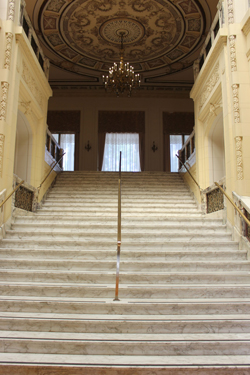In an ever-changing world of technology, websites such as Facebook and Twitter are becoming a popular medium for campus clubs and groups to communicate with each other. This is often done to remind members of monthly meetings and keep them updated on happenings in between them.
Freshman Sam Tok, feels that social media is very helpful in communicating an event. “Facebook groups for clubs are a great way for members to keep in touch and post happenings in the club.”
Clubs such as Residence Hall Association (RHA) set up a page on Facebook at the beginning of each semester and add members from the first interest meeting as well as new ones to the group.
Sophomore Kelly Schulhafer, is in the intramural softball club and feels that the page they currently have is a good idea. “The page is only open to club members and is a great way for people to stay connected with the group. If the page were left open to the public, it would not be as useful because people can access it randomly and request friends just by looking.”
Some clubs are not currently active on social media and are looking for new members. Junior Deanna Puglio feels that this would help gain new members. “I would like to see more members in the psychology club and I feel a social media page would do just that. If the page was created it could be open to all of MU and not just the club to get an idea who is interested.”
Even faculty feel that social media is a plus when it comes to ensuring that everyone is on the same page. Golam Mathbor, Associate Dean of the School of Humanities and Social Sciences and advisor of Phi Eta Sigma, the freshman honor society is very enthusiastic about this when it comes to clubs. “Social media sites are very beneficial for clubs as they ensure that members are on the same page when it comes to questions or agenda for the next meeting.”
This past fall, RHA sponsored its annual “Battle of the Buildings” for all resident students. Each paper flyer, email or poster made for the event had a special hash tag (#) code that students were able to use to share pictures or memories from the event. With this rise in social media trends in events like this one, people must be aware of the precautions that must also be taken when uploading pictures or using the site to communicate meeting information.
Mathbor also said, “People can get very abusive with social media sites so precautions must also be taken.” Most clubs that have a page close it to members of the group, which means in order to be a member one must join the club and have an administrator from the group add him or her to the page. This allows postings from the group to be seen only by individuals who are in it thus maintaining privacy; however there are some other groups that are open, meaning anyone can join without requesting.
Sophomore Stephanie Mamo feels there are pros and cons for both. “It is really awesome to see what specific clubs offer without being a member, but I also like my privacy when people have to request to be in the group.”
Social media sites have a lot of positive results when it comes to their impact on clubs. From gaining new members to keeping the group informed on the latest happenings, they are becoming another tool in the lines of communication.




